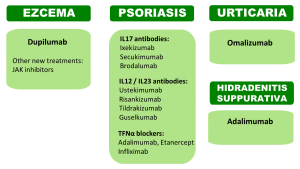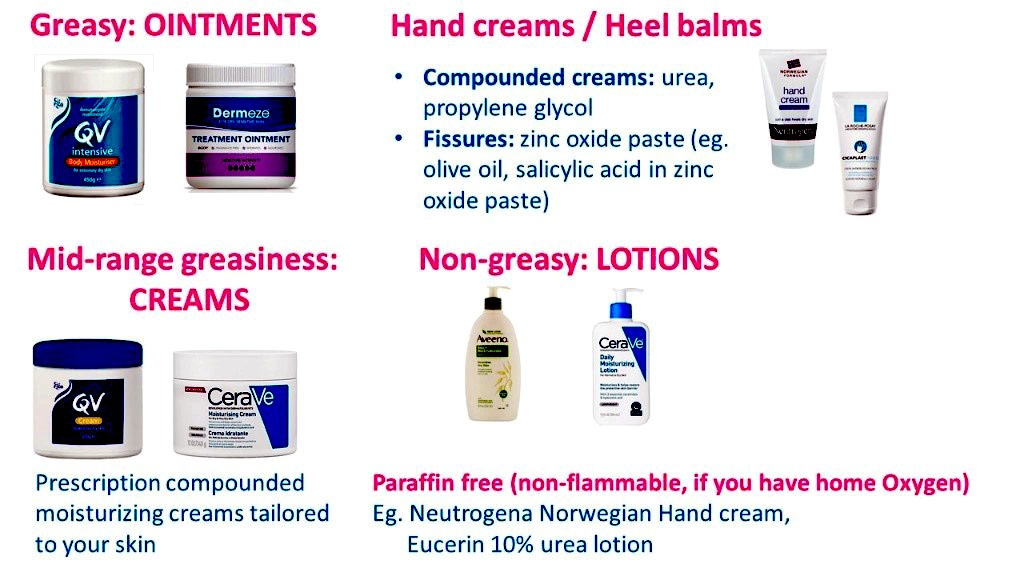As a medical Dermatologist who is involved in research into the causes and new treatments for skin rashes caused by the immune system, “Biologics” are a really big part of both my academic and clinical work. I care for a rapidly increasing group of patients who benefit so much from receiving these highly effected, targeted treatments. So, I wanted to try to convey some of the important facts about Biologics in Dermatology and how you might be able to access these treatments if you have a relevant inflammatory skin condition.
It’s a big complex topic… so here goes!
A. A bit about Biologics
“Biologics” (or Biologicals) is a name given to a group of new injection medications which target the specific molecules, cells and pathways in the immune system which cause inflammation in particular diseases. In the “old days”, before the era of these precise targeted medications, we only had very nonspecific medications. For example, Methotrexate is an immunosuppressant medication that we use for many and varied conditions including psoriasis, eczema, lupus, inflammatory arthritis and many more. Methotrexate, and many other traditional medications, can be used for such a wide range of diseases, because they are not specific or targeted.
But nowadays, we are becoming smarter. We are slowly understanding specifically which cells, molecules and immune pathways trigger or contribute to different inflammatory conditions. And we are able to use that knowledge, to then develop medications that can specifically block those pathways, for specific diseases. Collectively, these treatments are called Biologics, and they are given as injections.
Biologics are highly effective and are slowly changing the lives of many of my patients.
In Dermatology, we have access to an increasing number of Biologics for inflammatory skin rashes.
B. Biologics in Dermatology
Most commonly, Biologics are prescribed in Dermatology and available on the PBS for severe and treatment resistant:

Chronic inflammatory skin rashes such as Eczema and Psoriasis have a big impact on people’s lives. Knowing that we are now at a stage in medicine where we have an increasing number of effective targeted treatments is so important. These medications change lives, so please know you no longer need to put up with your itchy and/or scaly skin from these conditions.
Although Eczema, Psoriasis, Urticaria (hives) and Hidradenitis Suppurativa (HS) are currently the only skin rashes where Biologics are a treatment option on the PBS, these treatments are an exciting area of ongoing research, and the list will only increase and evolve over the coming years – so watch this space!
As a subspecialist in Connective Tissue Diseases, I am of course especially involved and interested in the development of targeted treatments for the skin in conditions such as Lupus and Scleroderma. Although not PBS listed, we can access Biologics such as Rituximab, Belimumab, and hopefully soon Anifrolumab for Lupus in special circumstances; all of which may be helpful for severe skin involvement. We are a little bit further off having access to Biologics for Scleroderma… but the day is edging ever closer.
C. Can I access a Biologic for my skin in Amanda’s Biologics Clinic?
I am passionate about ensuring my patients have access to the latest evidence based treatments for their skin conditions. When it comes to Biologics, this means I run a Biologics clinic in my private practice, and I am also involved in Clinical Trials investigating the safety and effectiveness of new Biologics in Dermatology.
I care for a large and growing group of patients on Biologics. Due to the complexity of these medications, not all Dermatologists prescribe them in Private Practice. As a Medical Dermatologist, with extensive expertise in inflammatory skin conditions and immunological research, I do.
My patients on Biologics at Melbourne Dermatology Clinic have streamlined care which is strongly supported by
- Administrative staff, who take care of the administrative Medicare paperwork submissions, follow these up, let you know when your application has been approved, and help arrange getting your prescription and medication to you.
- Specialist Dermatology and Biologics nurses, who will
- assist with signing you up for relevant patient support programs for patients taking these medications,
- train and support you in learning how to give yourself the injections, or
- see you in our clinic and give you your injections if this is what you’d prefer (we do not charge for this).
Assessing if you are eligible
If you have severe Eczema, Psoriasis or Urticaria (hives), and come to see me, we will be able to ascertain whether or not you will be eligible for a Biologic on the PBS.
Biologics are expensive and as a result there are strict rules we must follow before you will be able to access a Biologic on the PBS for these conditions. We will need to carefully assess the severity of your skin rash, and generally speaking you will need to have tried more commonly prescribed traditional treatments first.
If and when you are eligible, we can start working through the process of accessing this for you. Sometimes this can be done on the same day as your initial appointment, but often further tests will be needed.
If and when you are eligible, what happens next?
Biologics are pretty serious medications, and need complex and thorough evaluation and monitoring. Prior to starting on a Biologic, and while you are taking it, we need to carefully review your medical history and do various blood tests. This also involves checking your vaccination status (all vaccinations need to be up to date, and you need to be immunised against Hepatitis B. You may also need boosters of previous childhood vaccinations.
Once these are all sorted and we are ready to go, I will complete all the supporting paperwork and our Admin team will submit it to Medicare for approval. We will then be in touch with you once approved and liaise with you to organise your prescription, and having your first injection.
Receiving your first Biologic injection
Your first biologic injection must be under medical supervision, and you must remain in the clinic for at least 15 minutes after receiving it. You can do this at Melbourne Dermatology Clinic, supported by our Dermatology and Biologics specialist nurses, or sometimes at your GP clinic.
At the time of your first injection, our nurses will educate you on self-injecting, provide you with relevant explanatory material, and sign you up for patient support programs specific to your medication. You will need to have sharps containers at home and other things you’ve probably not thought about before – we can assist you with how to arrange these things.
When will you notice your skin starting to improve and what happens next?
How long it takes for your skin to start improving really depends on your skin rash, and your specific treatment. It can sometimes be within days (eg. patients with eczema will often notice less itch within days) but usually weeks. Improvement usually continues over about 4 to 6 months.
It is important to know that Biologics are not a cure for any skin condition, and to continue benefiting from them, you need to continue taking them. How often you will have your Biologic injection depends on the particular medication, and they are anything from once every 2 to 16 weeks.
Generally speaking, we will need to ‘prove’ the Biologic is working for you after 4 months of treatment, and then every 6 months after that. This involves reapplication to Medicare each time. As a result, these appointments need to be done in person, with a face to face appointment so I can formally assess your skin, and ensure all Medicare requirements are also met.
How much will it all cost?
If we are accessing your Biologic through the PBS, it won’t be expensive; just like any other PBS listed medication.
Biologics appointments with me at Melbourne Dermatology Clinic are $280 (you will receive a Medicare rebate for these appointments, if you have a referral from you GP).
Once you are stable on the medication and all is well, you will usually only need to see me every 6 months (as per Medicare requirements).
Due to the strict rules around prescribing these medications, if you lose your prescription, special applications will need to be submitted to Medicare to issue you with a replacement script. This is a time consuming process for us and will therefore mean there is a $60 fee assigned to this – so please keep your script in a very safe place!
What if I don’t qualify for a Biologic on the PBS?
There are many reasons why you may not qualify for a Biologic on the PBS
- Your skin rash may not have any Biologics available on the PBS (only Eczema, Psoriasis and Urticaria (hives) are eligible via Medicare)
- You may not have a Medicare card
- You may have a past history of cancer or another medical condition which makes prescribing you a Biologic unsafe
- According to PBS rules your skin condition might not be severe enough. This does not mean your rash is not severe for you, and we will be able to come up with an alternative plan, so don’t worry.
If this is the case for you, we will spend time discussing other options available, of which there are usually many.
If you have troubling Eczema, Psoriasis, Urticaria (hives) or Hidradenitis Suppurativa and would like to see me for a Biologics appointment, please get in touch and I’d be very happy to see you.
Written by AProf Amanda Saracino
© 2023 AProf Amanda Saracino




